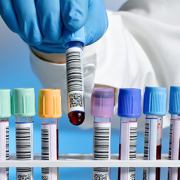Pharmacogenomics: a new normal for the NHS?
The analysis of the genomic determinants of drug response is a hot topic in healthcare and was the focus for a workshop last month
Pharmacogenomics has enormous potential to enable more accurate prescribing for better treatment and less waste. Knowledge in this area is improving all the time, and on 22nd May the GEP held a workshop in association with the UK Pharmacogenetics and Stratified Medicine Network to explore the benefits of pharmacogenomics and its status in the NHS.
Moving towards personalised medicine
According to Professor Munir Pirmohamed, who spoke at the event, the majority of commonly-prescribed drugs (such as antidepressants) only work in 30-50% of people for whom they are prescribed. Adverse reactions to medications account for 6.5% of UK hospital admissions, and 15% of hospital inpatients have an adverse reaction to a medication during their stay in hospital. Together, these result in around 8,000 overnight stays in hospital beds each year, costing the taxpayer £1 billion.
The goal of integrating pharmacogenomics into routine NHS practice is to both provide patients with safer and more appropriate therapies and to avoid wasting time and money on treatments that will be at best ineffective and at worst harmful. Many believe that the cost of testing will be offset by the money saved.
In the longer term, the aim for pharmacogenomic testing would be to move from a reactive approach, where patients are screened when they become ill, to a pre-emptive approach, as the NHS adapts and genomic data is increasingly integrated into healthcare.
Working with the evidence
Professor Dame Sue Hill, Chief Scientific Officer for England, talked about the importance of using an evidence-based approach when considering roll-out of pharmacogenomics:
“We have a real opportunity through the results that have been returned through the 100,000 Genomes Project to really look at what is required – rather than assume we know what is required – and how the pathways of care will need to change to accommodate these findings.”
NHS England and Genomics England have set up a pharmacogenomics working group, composed of experts from across the UK, which has compiled a list of actionable gene-drug pairs and developed a framework for deciding which should be prioritised. A number of factors are considered:
- Allele frequency: how many of the people tested are likely to have the variant in question? The more common the variant is, the more patients are likely to benefit from testing.
- Clinical benefit: what proportion of people are likely to have a reaction, and how serious are the symptoms if they do? For variants that impact efficacy, how strong is the effect of the variant, and what are the health outcomes if patients are not adequately treated (or over-treated)?
- Drug usage: is the drug commonly prescribed, or does it account for a large slice of NHS spending?
- Body of evidence: the quality and quantity of evidence about the gene-drug association.
Timelines
Professor Hill said that by 2020 the NHS Genomic Medicine Service will be fully operational, meaning that the routine use of genomic screening and personalised treatments will be the new normal in the NHS. By 2025, half a million whole genomes should have been sequenced through various pathways of routine care in the NHS.
This volume of genomic data will be necessary to enable us to understand the links between genes and drug response better; and this, in turn, will inform decision-making about pharmacogenomic testing in the health service.
Next week, we’ll explore some of the challenges of integrating pharmacogenomics into the NHS. In the meantime, you can watch the discussions that took place at the event.
–









